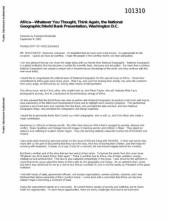/ library resources
Showing items 1 through 9 of 11.The study explores the relationship between decentralization and conflict, comparing two case studies in Cambodia and the Philippines.
The study analyzes the impact of degradation of private land as well as common land resources on migration decisions in three dryland districts in Gujarat.
While external forces can take many forms, such as the shock of a natural disaster which destroys productive assets, or the long-term ‘trend’ of consistently declining market prices which limits net incomes, the focus of this research is on the policy and institutional environment both within and
The review reveals watershed management research as an interdisciplinary effort at multiple scales within a long-term movement towards informed participatory decision-making. Watersheds, together with aquifers, are the most important units for data collection and modeling in water management.
In response to many requests for help in the application of both conventional cost benefit analysis in transport and addressing of the newer topics of interest, we have prepared a series of Economic Evaluation Notes that provide guidance on some of issues that have proven more difficult to deal w
The Little Green Data Book 2005 is based on the World Development Indicators 2005, and represents an abbreviated collection of information. Its production is a collaboration between the Development Economics Data Development Group, and the Environment Department of the World Bank.
Paul Wolfowitz, President of the World Bank, congratulated the editorial team of National Geographic for the special issue on Africa. National Geographic has played a unique role in broadening the knowledge of the world.
Pagination
Land Library Search
Through our robust search engine, you can search for any item of the over 73,000 highly curated resources in the Land Library.
If you would like to find an overview of what is possible, feel free to peruse the Search Guide.









